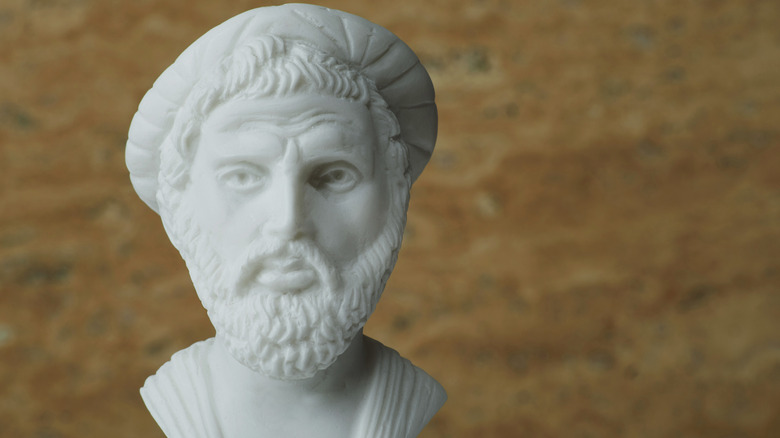The Ancient Greek Philosopher Who Helped Popularize Vegetarianism
We live in a world today where vegetarianism isn't a wild concept. According to Deals on Health, 22% of the world's total population eats a vegetarian diet (whether by necessity or by choice); they reportedly have a 12% lower cancer rate, have a reduced risk of heart disease, and are less likely to get type 2 diabetes. Harvard Health says that over the past decade, society, as well as the scientific community in the West (Eastern countries like India have historically been large proponents of vegetarianism), have finally begun to embrace the health benefits of a meat-free diet and no longer hold the belief that it causes nutritional deficiencies. Vegetarianism is defined as eating plant-based products and avoiding foods sourced from livestock, including red meat, seafood, and poultry, and some people go as far as not to eat dairy products or foods that come from animals either which is known as veganism.
Some people go vegetarian because the meat is too expensive to purchase, for religious reasons, moral and ethical concerns, environmentalism, or simply because they don't like meat! These are all incredibly valid, but were there always vegetarians? Could our ancient ancestors afford to be picky about what they ate, and if there weren't always vegetarians, when was vegetarianism as a diet choice introduced?
Older than Christianity
Let's get one thing out of the way really quickly, vegetarianism is not a new fad or diet movement. It is an ancient culinary practice that has been prominent in India since at least the introduction of Jainism almost 2,500 years ago under the practice of ahimsa which is the act of non-violence against all living things, including animals (via Super Prof). Since then, a large percentage of the Indian subcontinent has practiced vegetarianism. According to Britannica, "fleshless" diets were popularized (but existed well before) in India and the eastern Mediterranean around the same time during the middle of the 1st millennium BCE. While Jainism, and later Buddhism, as religious practices spread like a flame throughout the continent of Asia, further west in Greece, philosopher Pythagoras of Samos spread his teachings.
The Vegetarian Society claims that Pythagoras (580 BCE), most famously known for his mathematical work on the Pythagorean theorem, which bears his name, also taught his students to abstain from partaking in meals using animal meat. He was inspired by the older Babylonian and Egyptian societies which predated him. Vegetarianism was not invented by a single Grecian citizen, though he was a major propionate of it and all the benefits he believed it brought to a person's bodily and spiritual life. North African and Middle Eastern religious groups had been practicing what we would call vegetarianism since at least 3,200 BCE and even went so far as to avoid wearing clothes made from animals.

